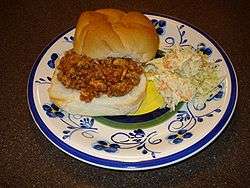Sloppy joe
|
Above: A homemade sloppy joe with coleslaw Below: Sloppy joe meat being prepared | |
| Alternative names | Wimpies, yip yips, slushburgers |
|---|---|
| Course | Main |
| Place of origin | United States |
| Serving temperature | Hot |
| Main ingredients | Ground beef, onions, sweetened tomato sauce or ketchup, Worcestershire sauce, seasoning, hamburger bun |
| Variations | Multiple |
|
| |
A sloppy joe is a sandwich consisting of ground beef, onions, tomato sauce or ketchup, Worcestershire sauce, and other seasonings, served on a hamburger bun.[1] The dish originated in the United States during the early 20th century.
History
Early 20th century American cookbooks offer plenty of sloppy-joe type recipes, though they go by different titles: Toasted Deviled Hamburgers,[2] Chopped Meat Sandwiches,[3] Hamburg a la Creole,[4] Beef Mironton,[5] and Minced Beef Spanish Style.[6]
Marilyn Brown, Director of the Consumer Test Kitchen at H.J. Heinz in Pittsburgh, says their research at the Carnegie Library suggests that the sloppy joe began in a Sioux City, Iowa, cafe as a "loose meat sandwich" in 1930, the creation of a cook named Joe.[7]
References to sloppy joes as sandwiches begin by the 1940s. One example is a 1944 Coshocton Tribune ad under the heading "Good Things to Eat" says "Sloppy Joes' - 10c - Originated in Cuba - You'll ask for more - The Hamburg Shop" and elsewhere on the same page, "Hap is introducing that new sandwich at The Hamburg Shop - Sloppy Joes - 10c." [8]
The term sloppy Joe's had an earlier definition of any cheap restaurant or lunch counter serving cheap food quickly, since 1940[9] or a type of casual clothing.[10]
Food companies began producing packaged sloppy joe sauce, such as Manwich, by the 1960s.
Variations
Several variations of the sloppy joe exist in North America. In Quebec, Canada, sandwiches of stewed ground beef such as pain à la viande and pain fourré gumbo are usually served on hot dog buns. A similar sandwich, the "dynamite," exists in the area around Woonsocket, Rhode Island, and is distinguished by the use of onions, bell peppers, and sometimes celery.[11]
Stewed meat sandwiches are common in several other culinary traditions as well. The rou jia mo, from China's Shaanxi Province, consists of stewed pork, beef, or lamb on a steamed bun. Keema pav of Indian cuisine uses a pav bread roll filled with keema, a minced, stewed, curried meat.[12]
Ground turkey or textured vegetable protein may be used as a substitute for ground beef.
In New Jersey, a Sloppy joe is an unrelated sandwich made with deli meat.
See also
References
- ↑ Ingram, Gaye G., Labensky, Sarah R., Labensky, Steven. Webster’s New World Dictionary of Culinary Arts 2nd Edition.
- ↑ Good Housekeeping Cook Book, Katharine Fisher [1944] (p. 534),
- ↑ Young America's Cook Book, Home Institute of the New York Herald Tribune [1940] (p. 36)
- ↑ Prudence Penny's Cookbook, [1939] (p.67)
- ↑ The New Butterick Cook Book, Flora Rose [1924] (p. 266)
- ↑ Mrs. Rorer's New Cook Book, Sarah Tyson Rorer [1902] (p.157)
- ↑ The American Century Cookbook: The Most Popular Recipes of the 20th Century, Jean Anderson.
- ↑ Coshocton Tribune (Coshocton, Ohio), Oct. 29, 1944, p. 11
- ↑ Dictionary of American Slang, Wentworth & Flexner, 2nd supp. edition, p. 488
- ↑ Advertisement, Pittsburgh Press. Oct. 8, 1940
- ↑ Jonic, Flo (May 9, 2011). "Woonsocket's Dynamite Sandwich". Rhode Island Public Radio. Retrieved 2013-06-07.
- ↑ "Kheema Pav - Indian Sloppy Joes".
Further reading
- Strong, Andrea (October 9, 2002). "An Ode to Sloppy Joe, a Delicious Mess". The New York Times.
| ||||||||||||||||||||||||


